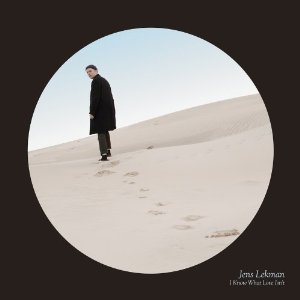You could be forgiven for thinking Jens Lekman had already recorded a break-up album. Since we first met the Swedish singer his default state has tended towards lovelorn, whether he’s mistaking a lover’s rueful words for a Fall reference or offering to sing at an ex-girlfriend’s wedding. On his last album, Night Falls Over Kortedala, he gave this romantic imbalance a twist: suddenly Lekman was the jilter, saying goodbye to a woman he loved too little.
Artists have been pigeonholed for less, and it’s little wonder that for this record he initially planned to leave such material behind. Yet Lekman, a consummate and frequently hilarious storyteller, has always turned to his life for inspiration and after he suffered a terrible break-up, he was left with no choice but to chronicle it: as he told Pitchfork, "I couldn’t really do anything about it."
If that raises the spectre of emotional incontinence, a messy impression of grief’s wake, I Know What Love Isn’t turns out to be something else. Lekman has always exposed himself in his writing, and that quality is in evidence here. He addresses his former lover on ‘I Want A Pair of Cowboy Boots’ and the touching closer ‘Every Little Hair Knows Your Name’. Each depicts the shadow cast by her memory: the hairs on his body that refuse to forget her, the two years of dreams that she haunts. Yet Lekman’s candour lacks the rawness often found on this kind of album. He does not confront his ex, or even rail against her lingering presence; he just wearily wishes to be rid of it.
Elsewhere, we catch glimpses of what Lekman, for all his singlemindedness, has left out. "If you don’t love me then please have the dignity to tell me," he admonishes his girlfriend after she introduces him as a friend, before revealing: "but I never said any of that." Elsewhere he is put on the spot when asked what’s wrong. His response? "It’s nothing." (It really isn’t nothing.) These are some of the album’s more affecting moments, but they hint at what else Lekman isn’t saying. Also absent for much of the album is Lekman’s characteristic wit, mostly limited to the odd aside: "Sinatra had his shit figured out, I presume" is one memorable example.
A clue to Lekman’s approach lies in the chorus of ‘The World Moves On’, when he sings, "you don’t get over a broken heart, you just learn to carry it gracefully." I Know What Love Isn’t turns out to be a graceful break-up album, one that eschews ugliness and rage. Such restraint carries over to the music. A gifted songwriter and arranger, Lekman’s reference points (disco and Northern Soul among them) and canny employment of samples have long set him apart from other singer-songwriters. Indeed, his pop instincts are so honed that, in the past, the label scarcely fit.
It feels more appropriate here. Lekman has spoken of deliberately picking only a few of the colours from Night Falls Over Kortadala‘s vast, maximalist palette, and this gives the first half of the album a sound as focused as its subject matter. This doesn’t mean that it’s stripped down; rather, the overall effect is of smoothness. Piano is frequently foregrounded, while Lekman’s singing is as polished as ever – never straining as it once did – lending him a resigned rather than frail air. Much effort has gone into the arrangements, new details coming to light with each listen, but they are at times too careful: whereas previously horns might blare into life at any moment, now a saxophone or flute appears for a brief, orderly solo. These can be effective, especially the Paninaria sample on ‘She Just Doesn’t Want to Be With You Anymore’, but one is left longing for a taste of drama – or even a ‘Careless Whisper’ moment.
Such gloss without release creates an atmosphere of drift. Place names are referenced throughout, reflecting Lekman’s recent globetrotting – he lived in the US and Australia before immigration restrictions forced him back to Sweden. This emotional and geographical rootlessness is conveyed by the spacious production on ‘Erica America’ and ‘She Just Don’t Want to Be With You Anymore’. The jaunty, cloying piano on ‘Become Someone Else’s’ initially seems to stick out, until it becomes clear that its melody doesn’t lead anywhere – the journey it’s taking us on is ultimately directionless. This is the same stasis that Lekman sings about: wanting – and struggling – to move on.
Eventually the listener longs for Lekman to break free, and a trio of songs (each of them a highlight) arrive just in time, powered on by the rhythm section. ‘The World Moves On’ announces a shift in tone: a re-energised Lekman is back in raconteur mode, his delivery lighter and conversational. At over six minutes long, it has a meandering quality at odds with what precedes it. On the panoramic ‘The End of the World is Bigger Than Love’, Lekman struggles for perspective over soaring strings, his earnestness taking on a more playful, knowing form.
Catharsis of sorts comes on the penultimate track, ‘I Know What Love Isn’t’. Over an easeful, breezy guitar, Lekman takes us around Melbourne with his best friend, to whom he proposes marrying for a visa ("I’ve always liked the idea of it"). An unexpectedly rousing chorus seems finally to point to a way forward: "I don’t know what love is, but I know what it isn’t," he sings, finding joy in his confusion. The song ends on a more ambivalent note – "I know what love isn’t" he repeats, the words becoming less comfort than curse – but the point is made. If Jens Lekman had it all figured out, what would he have to sing about?


